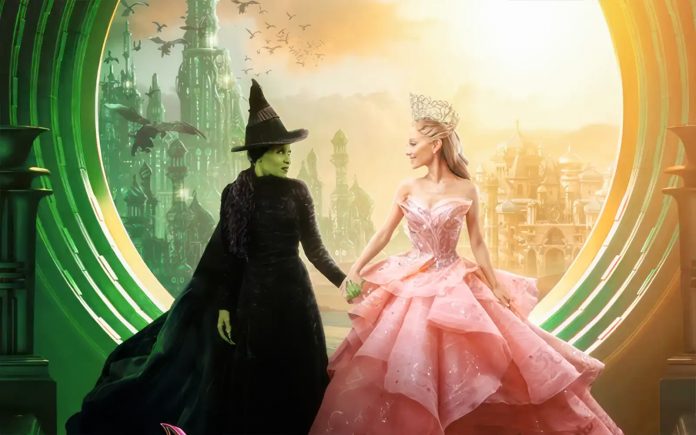
Jon M. Chu’s adaptation of “Wicked” brings the beloved Broadway musical to the big screen with dazzling visuals and heartfelt performances. Yet it fails to capture the emotions and complexity that made its stage counterpart iconic. While the film introduces impressive cinematic techniques and deepens the relationship between Elphaba and Glinda, its sprawling runtime and uneven narrative make for a spectacle that occasionally dazzles but often drags.
The film follows the rise of Elphaba (Cynthia Erivo), the misunderstood green-skinned heroine destined to become the Wicked Witch of the West, and Glinda (Ariana Grande), the pink-loving, bubbly and ambitious “Good Witch.” While the Broadway production offered a tightly woven tale of friendship, power and societal prejudice, the film stretches the narrative, only covering the first act of the stage show and losing thrilling parts in the process.
Erivo delivers a powerful performance as Elphaba, infusing the character with vulnerability and defiance. Her rendition of “Defying Gravity” is a high point, showcasing her soaring vocals and emotional intensity. Grande brings charm and comedic timing to Glinda, particularly in her performance of “Popular.” Yet her portrayal lacks the layered complexity that could fully balance Elphaba’s journey. Bilge Ebiri of Vulture has noticed the chemistry between Erivo and Grande as compelling but not quite electrifying.
The supporting cast, including Jonathan Bailey as the mischievous Fiyero, adds moments of levity and intrigue. Bailey’s charisma shines in “Dancing Through Life,” providing a lively counterpoint to the film’s darker, introspective moments. However, the depth of pivotal supporting characters feels underexplored in this adaptation, leaving their arcs less impactful than in the stage production.
Visually, “Wicked” is a feast for the eyes. Cinematographer Charlie Sarroff’s use of dynamic contrasts — the glittering grandeur of the Emerald City and the desolate isolation of Elphaba’s world — enhances the story’s themes of duality. The production design is undeniably extravagant, with sets such as the lavish palace of the Wizard and the eerie forests of Oz brought to life with meticulous detail. Yet, some critics have found the visuals overly polished, missing the gritty authenticity that grounded the musical’s magical realism.
The film’s pacing is another point of contention. At over two hours, it dedicates ample time to exploring Elphaba and Glinda’s friendship, but the slow narrative beats occasionally stall the momentum. Johnny Oleksinski from New York Post has also noted that while the film’s first act builds anticipation, it leaves audiences with an abrupt ending that feels incomplete, setting the stage for its planned sequel rather than offering a self-contained experience.
Critical reception has been mixed. Christy Lemire of RogerEbert.com praised Erivo’s performance: “You feel every ounce of Elphaba’s pain and power, especially in the show-stopping ‘Defying Gravity.’” Meanwhile, Bilge Ebiri of Vulture described the film as “a lavish spectacle that captures the Broadway magic but struggles to maintain its emotional depth.” Entertainment Weekly highlighted the production design but criticized the pacing: “The film’s visual grandeur can’t fully compensate for its uneven narrative rhythm.”
Despite its shortcomings, “Wicked” is an ambitious and grand adaptation. For fans of the musical, it’s a chance to revisit the enchanting world of Oz with a new perspective. However, those hoping for a bold reimagining may find themselves yearning for the emotional clarity and narrative cohesion of the stage production. As the first installment of a two-part saga, “Wicked” sets the stage for what promises to be a dramatic continuation, even if its opening act doesn’t entirely hit the right notes.
